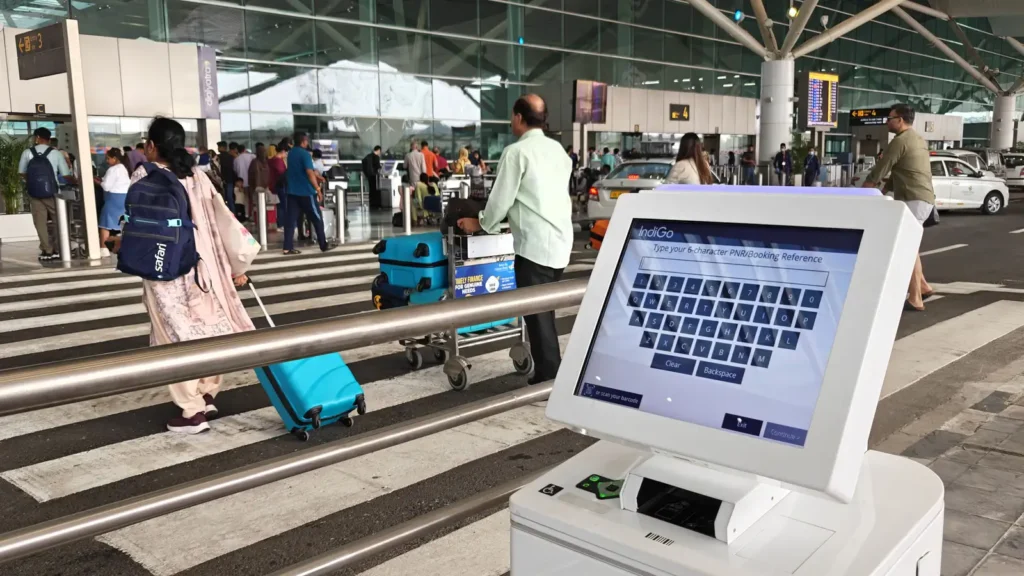Over 90 Flights Cancelled at Delhi’s IGI Airport Amid Rising Indo-Pak Tensions
New Delhi, May 8 — Air travel chaos gripped Delhi’s Indira Gandhi International (IGI) Airport on Thursday morning after airlines cancelled more than 90 flights due to growing tension between India and Pakistan. The large-scale disruptions left hundreds of passengers confused, frustrated, and stranded across the terminals.

Airport authorities confirmed that airlines cancelled 46 domestic departures and 33 domestic arrivals. Several international flights also faced delays, diversions, or groundings as carriers adjusted operations in response to ongoing geopolitical developments.
Passengers Face Sudden Cancellations and Long Waits
Many passengers reached the airport on time only to discover their flights had been cancelled minutes before departure. Airline staff offered limited support, which led to long queues, unanswered questions, and visible frustration.

“I came early for my flight to Mumbai,” said Reena Chopra, a frequent flyer. “After clearing security, I received a cancellation text. There was no help desk, no one to talk to—just total silence.”
Airline counters struggled to manage the sudden influx of distressed travelers. With very few staff on hand, people waited for hours seeking rebookings, refunds, or even basic information.
Why Are Flights Being Cancelled?
Although the government hasn’t issued an official statement, aviation insiders believe the cancellations stem from heightened military activity in northern India. Sources suggest that increased operations near the Indo-Pak border have restricted access to several air corridors, which disrupted civilian air traffic.
Officials from the Directorate General of Civil Aviation (DGCA) and the Ministry of Civil Aviation have so far avoided linking the cancellations directly to defense activity. However, they continue to monitor the situation and remain in constant contact with airline operators.
Airlines Respond to the Crisis
Several major carriers, including IndiGo, Vistara, Air India, and SpiceJet, felt the impact. IndiGo released a short statement, citing “operational constraints” and apologized for the inconvenience.
“We’re doing our best to manage schedules under difficult conditions. Passengers should check flight status before heading to the airport,” said a spokesperson.
Air India also issued updates, promising to assist affected passengers by offering refunds or rebooking them on the next available flights. However, due to the high volume of summer travel, many customers struggled to find immediate alternatives.
What Travelers Should Do Now
With the situation still evolving, airlines and travel authorities recommend that passengers:
- Confirm flight status online or through airline apps before leaving for the airport
- Opt for travel insurance and flexible tickets during this period
- Contact customer support early for rescheduling or refunds
Most airlines have waived rescheduling fees for affected routes and are trying to offer flexibility where possible. Still, travelers should brace for ongoing delays and limited seat availability.
Security Experts Raise Concerns
Aviation experts warn that flight disruptions like these highlight how vulnerable civil travel remains during geopolitical flare-ups. Northern India’s airspace is among the country’s busiest, and even partial restrictions can affect a wide range of domestic and international routes.
“This isn’t new. We saw something similar after the 2019 Balakot airstrikes,” noted a senior defense analyst. “Whenever India-Pakistan tensions rise, the military takes control of certain air corridors. Civilian flights suffer as a result.”
During past conflicts, both countries have imposed temporary airspace closures, which triggered major rerouting efforts and affected global flight schedules.
Political Pressure Mounts for Transparency
So far, the government has remained silent on the exact cause of the disruptions. Neither the Ministry of External Affairs nor the Prime Minister’s Office has addressed the situation publicly.
Meanwhile, opposition leaders are demanding clarity. “People deserve transparency. If safety concerns exist, the government should tell the public instead of letting rumors spread,” said a senior opposition spokesperson.
Political analysts argue that clear communication from officials would help reduce public panic and prevent misinformation.
Will the Flight Disruptions Continue?
As of Thursday afternoon, some airlines managed to resume limited operations. However, officials and industry insiders expect the uncertainty to continue for the next few days. With rising summer travel demand and ongoing border tensions, further cancellations remain possible.
Experts advise travelers to avoid non-essential trips through affected regions and plan with flexibility in mind.
Ripple Effects Across the Country
The IGI Airport disruption may affect other major airports as airlines adjust aircraft rotation and crew schedules nationwide. Summer is one of the busiest seasons for domestic travel, with thousands of families planning vacations, and any long-term impact could lead to rising ticket prices and widespread delays.
Logistics and business travel are also taking a hit. Companies are now scrambling to rearrange meetings, supply chain shipments, and employee travel plans.






